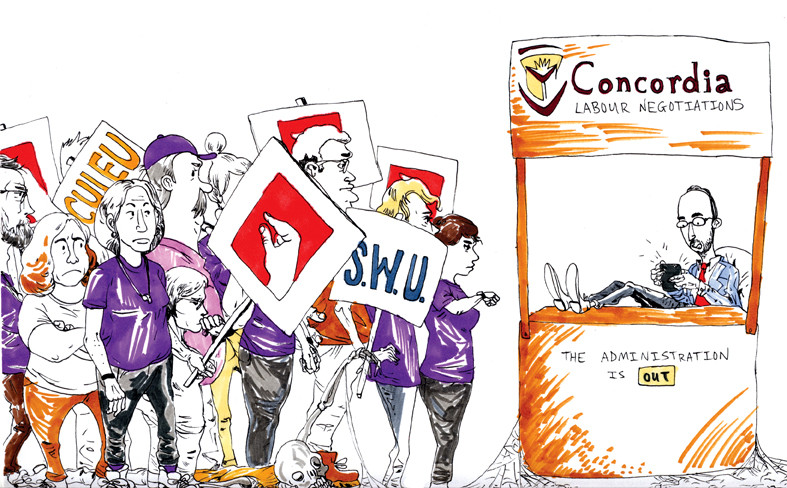Editorial: Labour Relations Need Good Faith
It’s no secret that the labour climate at Concordia leaves much to be desired. But if things are to ever get better, now is the time.
The university is seeking to improve its image, and the move is more than superficial. In the past year we’ve had a new president, Board of Governors chair and provost completely change the face of Concordia. Governance reforms have made clearer what can and can’t be done in severance packages—a much-maligned part of Concordia’s history.
Longtime Concordia Part-Time Faculty Union President Maria Peluso, who this year moves to the Board of Governors, has told us she has reason to be optimistic for the future of Concordia’s labour relations—in part due to the new faces leading the administration.
Considering she also says she’s seen things get progressively worse in her more than 20 years at the university, there are real reasons to hope for the beginnings of a changing tide here at Concordia.
With two unions having reached agreements with the university after years of working without the security of a contract, we feel optimistic too, albeit cautiously so.
Those unions, the Concordia University Library Employees’ Union and the Concordia University Union of Support Staff–Technical Sector, have come to an agreement with the university that was ratified by its membership last week. It amounts to a six-year contract for these workers.
Since negotiations went so long however, the contracts will expire in just 2015. The four years it took to get here are being applied retroactively.
According to CUUSS-TS President Alex Macpherson, his union got the best deal they could’ve hoped for given the circumstances. It’s something they’re willing to live with, and job security is nothing to scoff at amid funding uncertainty for Quebec universities.
For CULEU President Irene Fernandez, years of negotiations wore the union’s demand down to focus solely on salary adjustments.
And when we’re hearing that over 200 grievances have been filed by workers against the university for not honouring existing agreements, it’s clear that there is still much to be done.
While these two unions have reached collective agreements, the vast majority of unions are still in contractual limbo, in negotiations with expired agreements.
Reaching a collective agreement isn’t the endgame here, but these agreements are a step in the right direction—inching closer to building good faith between the university and its unions.
For good faith to truly exist over Concordia’s labour climate, it’s going to take time. It means that consistent care needs to be put into choosing who the university will send to the negotiation table, making sure that people who have worked under the contracts in question are included in their team.
CUPFA is set to begin their next round of talks, and have held an unlimited general strike mandate for close to a year. Their new president David Douglas has told us they’re not willing to take six years to reach an agreement, like it did for its last contract.
There’s no easy fix for the administrators to meaningfully impact Concordia’s labour climate. We understand that. For norms of good faith to be built, both sides must work carefully and be willing to move.
But Concordia’s strategy of “delay, delay, delay,” as union leaders have told us before, is one that must certainly disappear.


_600_832_s.png)

_600_375_90_s_c1.jpg)
_600_375_90_s_c1.jpg)
1web_600_375_90_s_c1.jpg)
_600_375_90_s_c1.jpg)